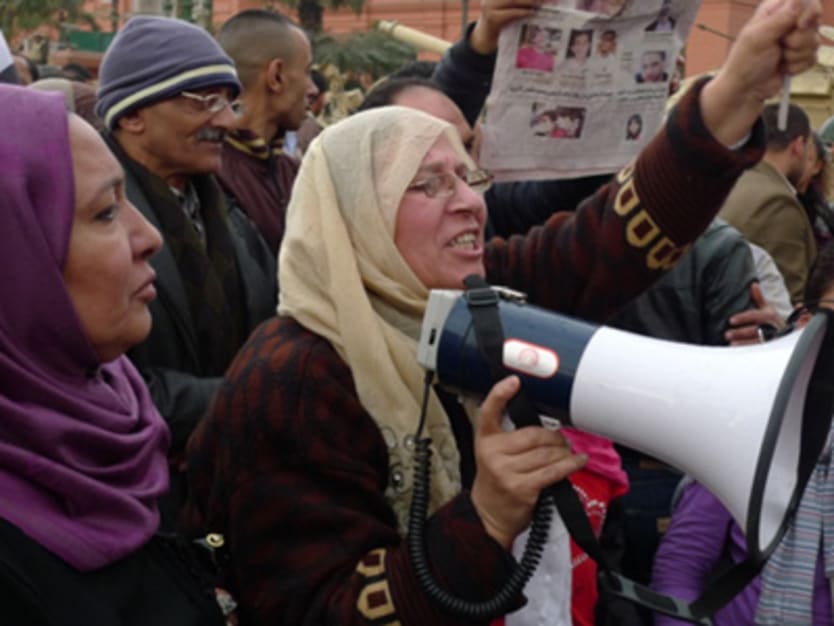
During the past three years, the Middle East has changed faster than anyone could have ever anticipated. When Mohamed Bouazizi set himself on fire in Tunisia in December 2010, he couldn’t have known his death would trigger extraordinary events that would transform the Arab world.
From the oceanic gatherings on Cairo’s Tahrir Square to the death of Col. Gaddafi in Libya, the political landscape has changed. But the transformation is still in motion, with a number of key forces fighting for power, from religious fundamentalists to the military. At a time when sectarianism is on the rise and reformists are clearly losing momentum, where does this leave women?
The picture is grim. A perception poll of gender experts by the Thomson Reuters Foundation shows that the rise of political Islam across Arab Spring countries has had a real impact on secularism. Almost three years after popular uprisings toppled autocratic leaders in one of the most conservative corners of the world, three out of five Arab Spring countries rank among the bottom five states for women’s rights.
Many political gains for women have been lost. In fact, women are struggling to preserve their dignity, and far from progressing, they are now fighting to preserve the rights they had before the Arab Spring.
Egypt, the country that embodies the spirit of the revolution, is today the worst country for women among the 22 Arab League states surveyed. The revolution has unequivocally failed to deliver on women’s expectations, experts in those states said. The same women who fought shoulder to shoulder with men, demanding social change in Tahrir Square, were expected to return to their traditional roles of mothers and wives once the crowds had dispersed. Worse, they are now suffering more abuse on the streets than ever before — 99 percent have been subjected to sexual harassment, according to a recent report by U.N. Women. The experts we polled told us how rape is increasingly used as a weapon to silence women in Egypt, and how perpetrators of violence enjoy impunity.
Life is not much better in Iraq, the second-worst country for women’s rights in the region, according to the survey. The experts said that radical Islamization of society, sectarian violence and a reaction against what many see as Western imperialism in the years after the 2003 invasion were all having a devastating impact on women. The “war on terror” has made widows of 1.6 million Iraqi women, leaving them without income and with few prospects of employment. In Iraq, only 14.5 percent of the entire female population is employed, and women have lost their voice in political circles. Mass displacement has made them vulnerable to trafficking and sexual violence.
The poll’s ranking of women’s rights across the Arab League highlights some of the issues now on the news agenda.
I think of Saudi Arabia, ranked third from the bottom, where women are not allowed to drive or go to the gym. In 2015, they will finally be allowed to vote, but only in municipal elections. The move indicates slow progress, and there is still no sign that the guardianship rules — according to which women can’t do much in life without the consent of a male guardian — will soon change.
I also think of Syria, suspended from the Arab League for its failure to end its civil war. Women and girls have paid the highest price of the conflict. At least 1 million of them are internally displaced. Another million or more are in refugee camps in Jordan, Lebanon and Turkey, where they suffer harassment, rape, and forced and child marriage. Women in Syria have been targeted by the Syrian security forces during the revolt and subsequent war, and thousands have survived rape and torture, rights groups say. Syrian jails are filled with women and girls.
The poll has also thrown up some unexpected results, like the fact that Kuwait and Qatar, for example, rank better than Lebanon and the United Arab Emirates. Thirty years ago, Lebanon was considered the Switzerland of the Middle East, but today, after years of sectarian violence and the rising Islamization of society, women are discriminated against by law. In Oman and in Kuwait — second- and third-best countries, respectively, for women in the region — political stability and relatively liberal regimes make women feel safe and wealthy, respondents said.
In Tunisia, which was the most advanced Arab country for women a few years ago, the situation is mixed. Tunisia ranked sixth in our poll, behind Comoros, Oman, Kuwait, Jordan and Qatar. And this is a country where abortion was legalized in 1965, well before the United States and Britain. Women face increased levels of harassment in the streets, but almost 27 percent of parliamentary seats are held by women, and last year the government introduced the first domestic violence hotline and opened a number of shelters for victims of abuse. Tunisian women can now pass their citizenship to non-Tunisian-born husbands and to their children. They also enjoy 30 days of maternity leave at 67 percent of full wages.
The country that topped the ranking is the Union of the Comoros. This small archipelago nation in the Indian Ocean is no paradise for women, but French influence in the country’s legal system has given them more rights than anywhere else in the Arab League, including the countries at the heart of the Arab Spring.
Revolutions take time. The French Revolution was followed by years of terror and conflict before stability. Arab women have discovered through their revolutions that they can have a voice, and this, for me, is the seed of hope for the future.
Full interactive poll results, methodology and editorial coverage are available in both English (poll2013.trust.org) and Arabic (araa.trust.org). Hashtag: #arabwomen. Women’s Rights in the Arab Spring is one of the themes at the forthcoming Trust Women Conference (London, Dec. 3-4). Discounts available now at www.trustwomenconf.com.
